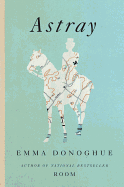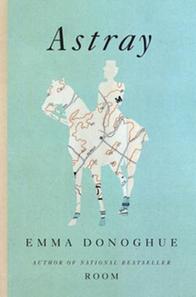
 Emma Donoghue's Astray is a collection of 14 short stories inspired by events and personages of the past, the majority of which are drawn from the 1800s. Fans of her previous novel Room will recognize the same imaginative flexibility and ventriloquism in Astray, only multiplied and lightly patinated. As befits their period, the fictionalized accounts have a stereoscopic, peering perspective, yet they do not read as stiff or fixed. Donoghue's close focus on her characters' yearnings and her respect for pivotal consequences transcend old-timey reenactment. She also avoids research-larding in spite of what appears to be a deep fluency with matters as arcane as Yukon gold miner libations (hootchinoo, anyone?) and the laws concerning body-snatching in 19th-century Illinois. At the end of each story, Donoghue appends a précis that makes clear what she borrowed and what she invented.
Emma Donoghue's Astray is a collection of 14 short stories inspired by events and personages of the past, the majority of which are drawn from the 1800s. Fans of her previous novel Room will recognize the same imaginative flexibility and ventriloquism in Astray, only multiplied and lightly patinated. As befits their period, the fictionalized accounts have a stereoscopic, peering perspective, yet they do not read as stiff or fixed. Donoghue's close focus on her characters' yearnings and her respect for pivotal consequences transcend old-timey reenactment. She also avoids research-larding in spite of what appears to be a deep fluency with matters as arcane as Yukon gold miner libations (hootchinoo, anyone?) and the laws concerning body-snatching in 19th-century Illinois. At the end of each story, Donoghue appends a précis that makes clear what she borrowed and what she invented.
Conjuring period slang and attitudes to animate characters as diverse as a 1630s Puritan snitch and a 1960s retired Ontario sculptress is a tough exercise, but apart from one story set in 1870s Arizona about a husband-wrangler that sounds a bit too much like a 1940s western, Donoghue's interior monologues and verbal exchanges enhance the immersive effect. The first story is an imagined transcription of Jumbo's London trainer coaxing the famous elephant through some hard transitions; it's as tender a bro-pachymance as you'll find in words. Many of the stories reveal the moral ambiguities of survival and reinvention; others remind the reader of how precarious travel and communication were in pre-digital times.
Though the stories are arranged under thematic headings ("Departures," "In Transit," "Arrivals and Aftermaths"), Astray is a refreshing break from the trend of linked collections; each story is entirely discrete, and strong enough to be read in isolation--which is recommended because their peculiarity and particularity supersede their groupings. Also, the collection's chronological hopscotching can be disorienting if read as ordered (the "Arrivals and Aftermaths" sequence yanks the reader from 1630s Cape Cod to 1830s Louisiana, then back to Revolutionary-era New Jersey). More helpful than the thematic headings is Donoghue's substantial and elegant afterword, in which she explains her approach to the material, including a clue as to why the stories are all so satisfying and self-sufficient: they were composed over a span of 15 years, or the writerly equivalent of a stagecoach pace. --Holloway McCandless
Shelf Talker: A pithy collection of short stories from the author of Room, inspired by unusual real-world events from the past.

